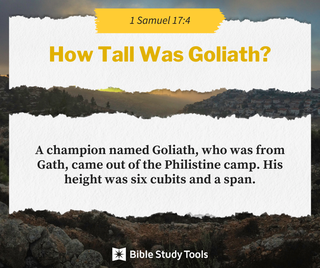
- Recent Translations
- All Translations
1 Samuel 17
Share
Settings
David y Goliat
1 Los filisteos reunieron sus ejércitos para la guerra, concentrando sus fuerzas en Soco, pueblo de Judá. Acamparon en Efesdamín, situado entre Soco y Azeca.Images for 1 Samuel 17

1 Samuel 17 Commentary
Chapter 17
Goliath's challenge. (1-11) David comes to the camp. (12-30) David undertakes to fight Goliath. (31-39) and goes to meet him. (40-47) He kills Goliath. (48-58)
Verses 1-11 Men so entirely depend upon God in all things, that when he withdraws his help, the most valiant and resolute cannot find their hearts or hands, as daily experience shows.
Verses 12-30 Jesse little thought of sending his son to the army at that critical juncture; but the wise God orders actions and affairs, so as to serve his designs. In times of general formality and lukewarmness, every degree of zeal which implies readiness to go further, or to venture more in the cause of God than others, will be blamed as pride and ambition, and by none more than by near relations, like Eliab, or negligent superiors. It was a trial of David's meekness, patience, and constancy. He had right and reason on his side, and did not render railing for railing; with a soft answer he turned away his brother's wrath. This conquest of his own passion was more honourable than that of Goliath. Those who undertake great and public services, must not think it strange if they are spoken ill of, and opposed by those from whom they expect support and assistance. They must humbly go on with their work, in the face not only of enemies' threats, but of friends' slights and suspicions.
Verses 31-39 A shepherd lad, come the same morning from keeping sheep, had more courage than all the mighty men of Israel. Thus God often sends good words to his Israel, and does great things for them, by the weak and foolish things of the world. As he had answered his brother's passion with meekness, so David answered Saul's fear with faith. When David kept sheep, he proved himself very careful and tender of his flock. This reminds us of Christ, the good Shepherd, who not only ventured, but laid down his life for the sheep. Our experience ought to encourage us to trust in God, and be bold in the way of duty. He that has delivered, does and will continue to do so. David gained leave to fight the Philistine. Not being used to such armour as Saul put upon him, he was not satisfied to go in that manner; this was from the Lord, that it might more plainly appear he fought and conquered in faith, and that the victory was from Him who works by the feeblest and most despised means and instruments. It is not to be inquired how excellent any thing is, but how proper. Let Saul's coat be ever so rich, and his armour ever so strong, what is David the better if they fit him not? But faith, prayer, truth, and righteousness; the whole armour of God, and the mind that was in Christ; are equally needful for all the servants of the Lord, whatever may be their work.
Verses 40-47 The security and presumption of fools destroy them. Nothing can excel the humility, faith, and piety which appear in David's words. He expressed his assured expectation of success; he gloried in his mean appearance and arms, that the victory might be ascribed to the Lord alone.
Verses 48-58 See how frail and uncertain life is, even when a man thinks himself best fortified; how quickly, how easily, and by how small a matter, the passage may be opened for life to go out, and death to enter! Let not the strong man glory in his strength, nor the armed man in his armour. God resists the proud, and pours contempt on those who defy him and his people. No one ever hardened his heart against God and prospered. The history is recorded, that all may exert themselves for the honour of God, and the support of his cause, with bold and unshaken reliance on him. There is one conflict in which all the followers of the Lamb are, and must be engaged; one enemy, more formidable than Goliath, still challenges the armies of Israel. But "resist the devil, and he will flee from you." Go forth to battle with the faith of David, and the powers of darkness shall not stand against you. But how often is the Christian foiled through an evil heart of unbelief!
1 Samuel 17 Commentaries
Footnotes 6
- [a] "casi tres metros" . Lit. "seis codos y un palmo" .
- [b] "cincuenta y cinco kilos" . Lit. "cinco mil siclos" .
- [c] "casi siete kilos" . Lit. "seiscientos siclos" .
- [d] "esta bolsa" . Lit. "este efa" .
- [e] "pagano" . Lit. "incircunciso" ; también en v. 36.
- [f] "Gat " (mss. de LXX); "un valle " (MT).
Chapter Summary
INTRODUCTION TO FIRST SAMUEL 17
This chapter relates how the armies of Israel, and of the Philistines, prepared for battle, and where, 1Sa 17:1-3, describes a champion of the Philistines, who defied the armies of Israel, 1Sa 17:4-11, and while he was so doing, it informs us that David came into the camp, and he heard his words, and signified to one and another his inclination to fight with him, 1Sa 17:12-30, which being reported to Saul, David was sent for by him, and much discourse passed between them about it, 1Sa 17:31-37 when we are told the manner in which he engaged with the Philistine, and the victory he obtained over him, 1Sa 17:38-51 upon which the Philistines fled, and Israel pursued them; and on account of this action David was taken notice of by Saul, and brought to court again, as the following chapter shows, 1Sa 17:52-58.